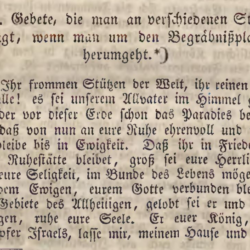| Source (German) | Translation (English) |
|---|---|
An den Hauptfesten, wenn man Behufs der üblichen Vorlesungen die Gesetzrolle aus der heiligen Lade nimmt. |
On the Shalosh Regalim, when one removes the Torah from the holy ark for the customary readings. |
Der Ewige ist unveränderlich das ewige Wesen, ein allmächtiger Gott! allbarmherzig und allgnädig, langmüthig von unendlicher Huld und Treue, der seine Huld dem tausendsten Geschlecht noch aufbehält, der Missethat, Abfall und Sünde vergiebt, der aber nichts ohne Ahndung hingehen läßt. (2 Mos. 34:6-7.) |
The Eternal is unchangeable, the eternal being, an almighty God, all-merciful and all-gracious, long-suffering of infinite mercy and faithfulness, who still reserves his mercy for the thousandth generation, who forgives iniquity, apostasy and sin, but who lets nothing go by without punishment. (Exodus 34:6-7 part) |
Herr der Welt! erfülle die Wünsche meines Herzens, wenn sie zu meinem Wohl sind. Laß mein Unternehmen mir gelingen und erhöre das Gebet deiner Dienerin.[1] Hier schaltet die Betende ihren Namen ein. Mache mich (meinen Mann, meine Söhne und Töchter) fähig, deinen Willen mit aufrichtigem Herzen zu erfüllen; laß keine Leidenschaft über uns herrschen; laß deine Lehre unser Antheil sein! Laß den Geist der Weisheit und der Einsicht über uns walten. Laß an uns erfüllt werden den Ausspruch der heiligen Schrift „Und es wird auf ihm ruhen der Geist Gottes, der Geist der Weisheit und der Einsicht, der Geist des Raths und der Stärke, der Geist der Erkenntniß und Gottesfurcht”. (Jesaias 11, 2.) |
Lord of the world, grant the desires of my heart if they are for my good. Let my enterprise succeed and hear the prayer of your servant.[2] Here the praying person turns on her name. Make me (my husband, my sons and daughters) able to fulfill your will with a sincere heart; let no passion rule over us; let your teaching be our portion! Let the spirit of wisdom and understanding rule over us. Let the saying of the Holy Scripture be fulfilled in us: “And the spirit of God shall rest upon him, the spirit of wisdom and understanding, the spirit of counsel and strength, the spirit of knowledge and the fear of the Lord.” (Isaiah 11:2) |
So sei dir auch angenehm, Ewiger unser Gott, daß ich so glücklich sei, Handlungen zu üben, die dir wohlgefällig sind, Wege zu wandeln, die dir recht sind. Heilige uns durch dein Gebot, daß wir zum glückseligen Leben gelangen, zum Leben der bessern Welt. Bewahre uns vor Uebelthaten, vor bösen Stunden, die uns übereilen im Leben. Wer auf Gott vertraut, den umgiebt Gnade. Amen. |
So also may it be agreeable to you, Eternal our God, that I may be so fortunate as to perform actions that are pleasing to you, to walk in ways that are right in your sight. Sanctify us by your commandment, that we may attain to the blessed life, to the life of the better world. Protect us from evil deeds, from awful moments that overtake us in life. Whoever trusts in God, grace surrounds them. Amen. |
“An den Hauptfesten, wenn man Behufs der üblichen Vorlesungen die Gesetzrolle aus der heiligen Lade nimmt” was translated/adapted by Yehoshua Heshil Miro and published in his anthology of teḥinot, בית יעקב (Beit Yaaqov) Allgemeines Gebetbuch für gebildete Frauen mosaischer Religion. It first appears in the 1829 edition, תחנות Teḥinot ein Gebetbuch für gebildete Frauenzimmer mosaischer Religion as teḥinah №18 on pp. 22-23. In the 1835 edition, it appears as teḥinah №18 on pp. 26-27. In the 1842 edition, it appears as teḥinah №20 on pp. 29-31.
We welcome corrections and improvements. The transcription of the German from Latin script in Fraktur type provided machine-readable text for a machine translation by DeepL, which we then edited for accuracy and clarity. –Aharon Varady
Source(s)



“An den Hauptfesten, wenn man Behufs der üblichen Vorlesungen die Gesetzrolle aus der heiligen Lade nimmt | On the Shalosh Regalim when one removes the Torah from the holy Ark, a teḥinah by Yehoshua Heshil Miro (1829)” is shared through the Open Siddur Project with a Creative Commons Attribution-ShareAlike 4.0 International copyleft license.










Leave a Reply